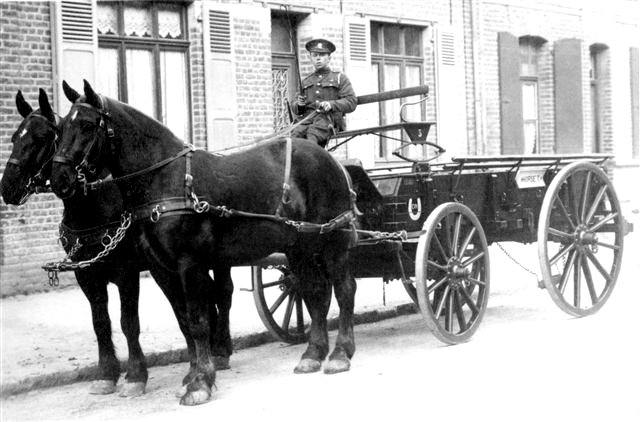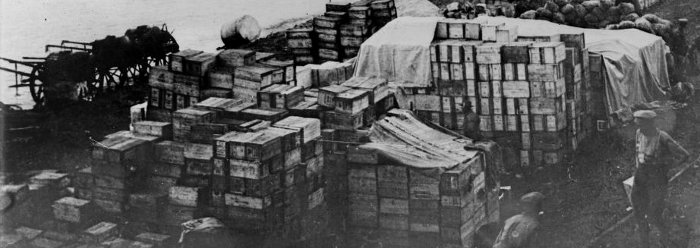Topic: Army Rations

Rations for a Big Army (1900)
Few Realize the Great Work Required to Get Supplies
Need Enormous Quantities
Collecting Them Involves a Vast Amount of Labor
Fighting Men Have Plenty
It is very probable that 90 people out of every 100 think of an army as a great aggregation of fighting men, armed to the teeth with rifles, swords and what not, while they never once give a thought to the "men in the rear."
The Pittsburg Press, Pittsburgh, Pennsylvania, 18 April 1900 (From the Detroit Free Press)
It is very probable that 90 people out of every 100 think of an army as a great aggregation of fighting men, armed to the teeth with rifles, swords and what not, while they never once give a thought to the "men in the rear." Yet these men in the rear are an important part of the fighting machinery.
When an army is encamped in a friendly country there is not so great a difficulty in feeding it as when it is penetrating hostile territory and has separated from its own country. And yet in either case it is no light task to furnish and distribute the food that is to keep, say, 30,000 stomachs satisfied and 30,000 hearts in the right place. This is the work of the commissary department.
When an army division or an army corps is encamped at home the problem of getting supplies is comparatively simple. Sometimes they are furnished on contract, sometimes bought in large quantities a week or more in advance of the time at which they will be needed. The commissary general is responsible for the procuring of these supplies and having them deposited at a depot within easy reach of the troops.
Each company of a regiment has its cooks, each regiment has its commissary depot, where supplies are kept sufficient, say, for a week or ten days for all the men. Men are detailed from each company to assist in the work of getting the supplies from the regimental depot to the company kitchens every day. Others are detailed to help transport the supplies to regimental depots from the general headquarters whenever the stores in the former are getting low.
As all supplies are issued from headquarters only on orders and receipts are given for everything secured, it can be seen that there is an immense amount of clerical work necessary to the smooth and uninterrupted work of the department.
When the troops are in barracks the work of the kitchen can be better attended to than in the field. Ranges and all necessary utensils are on hand and hot meals are served to the different mess tables with regularity. When in the field, either field stoves are used for cooking or partially covered trenches are constructed with an opening for the huge coffee kettle and an oven for the baking of bread.

Suppose an army to have landed on a foreign coast. The first move after the landing of the men and arms is to secure a convenient spot for a depot of supplies. These are landed and piled high on the shore until there seems to be a mountain of boxes inextricably mingled in the general mass. Gradually these are separated into different piles and order begins to make its appearance out of chaos, until all the supplies are properly housed.
For an army of 30,000 men and 10,000 horses for three months it is estimated that there are necessary 11,000 tons of food and forage. This must be made up of palatable and strength-giving supplies, with a proper proportion of meat. Vegetables, coffee and flour for bread or biscuits. The meat is generally canned, although sides of bacon are abundant, and even herds of cattle are taken along for fresh meat.
Whenever any important move is to be made by the army each soldier is usually supplied with rations for a day, which he carries in his haversack. These he is not to use unless ordered to do so. There are, besides, two days' rations carried in transport for each fraction of a command to tide the troops over the march. In the English army there are even wagon arrangements for cooking meals on the march, great quantities of soup being heated and meat and potatoes being prepared while on the march. But when the army moves away from its base of supplies then it is that the feeding problem becomes more complicated.
There are always a number of men detailed from each regiment to assist in the work of bringing up supplies. The keeping open of a line of communication with the base of supplies is the first thing that a commander must see to, for it means the safety of his army. If this line of communication is but a day's march, the work is simple, and it does not take many men detailed to wagon driving to replenish the impoverished stock of the regimental or division larder. But when the distance is increased to sixty or one hundred miles the trick is one of great difficulty.
There are along this line of communication two lines of transport wagons constantly on the move and in opposite directions. The one line is for wagons filled with stores and supplies for the army. The other is made up of empty wagons going back to base for other loads. Easy stages are made of the journey.
For instance, one set of loaded wagons will start from the base and go an easy distance, when another lot of empty ones will be coming in the opposite direction. The drivers and horses will be exchanged, those on the loaded wagons returning with the empty ones to the base of supply and those on the empty wagons taking the loaded supplies one stage nearer the army, at the end of which the same thing is repeated which the transportation of supplies and ammunition, too, is being carried on.
Within easy reach of the army is established a second base of supplies where a great amount of stores is accumulated in order to enable the army to extend its operations further from its principal base. Of course, a railroad makes the thing doubly sure and quick. But there is usually a good deal of wagon hauling to be done even with the railroads, because it is not often possible for an army to confine its operations to the line of rail communication. In any case, from the nearest base supplies are brought to the division or regimental wagons, which are filled on requisition and receipts are given for the supplies received.
A week's supply or even ten days' food should be at hand with the army. From the regimental depots the company gets its food for each day, and it is transferred to the company kitchen. Here are great kettles of coffee steaming over the fire, with bacon or other meat steaming in the pans. Thus the food which started as the contents of one of the boxes in the mountain on the shore, finally comes to the plate of the soldier to give him strength.
Sometimes a flying column takes no commissary train with it, cuts itself off from its base of supplies and moves swiftly through the country taking a few days' rations. This cannot be done unless the country is thoroughly known and can be depended on for food.
Sir George Head, writing of his experience in charge of the commissary in the peninsular war, says that 3 o'clock ever morning found him in the presence of the commanding general, where he was told of the movements of the army for the day. He would then go to his own quarters, where he found scores of representatives of the different parts of the army waiting for information. Sometimes, he said, he was obliged to ride out in the rain and scour the country for wheat to be made into flour for that night's distribution.
The worry of such a position can scarcely be imagined, for even after a supply of wheat was found, it had to be transported to mill, ground and carried to a convenient place for distribution among the parts of the army, which operations required the services of many men and teams.
There is considerable red tape required to get provisions, no less than seventy-five different kinds of blanks being supplied to use as requisitions.

